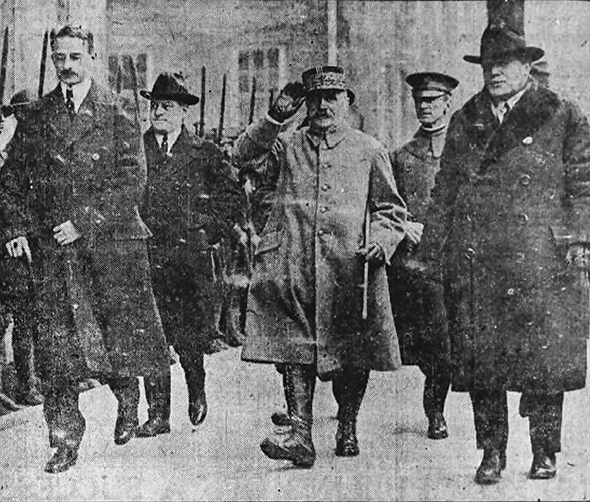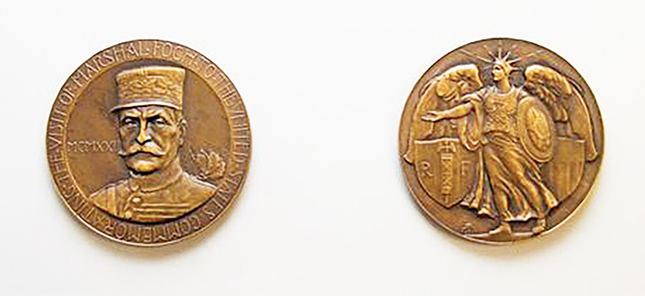
Boston Globe
Marshal of France Ferdinand Foch (center in photo) in New Haven on November 12, 1921. At left is Hiram Bingham III ’98; at right is Connecticut governor Everett J. Lake.
View full image

Boston Globe
Marshal of France Ferdinand Foch (center in photo) in New Haven on November 12, 1921. At left is Hiram Bingham III ’98; at right is Connecticut governor Everett J. Lake.
View full image

Yale University Art Gallery
Medals were struck to commemorate Foch’s visit; the Art Gallery has one.
View full image

Yale University Art Gallery
Medals were struck to commemorate Foch’s visit; the Art Gallery has one.
View full image
One hundred years ago this fall, French military leader Ferdinand Foch came to America for a triumphal tour. Among the many stops on his visit was Yale, where he received an honorary degree. But what really made an impression on him was getting a taste of American football at the Yale-Princeton game.
Foch, who had been appointed commander in chief of the Allied armies in May 1918 and Marshal of France three months later, was considered the leader most responsible for the Allied victory in World War I. For six weeks in 1921, as the guest of the American Legion, Foch toured the United States, receiving more than 30 honorary degrees and awards. On Armistice Day, November 11, Foch spoke at Arlington National Cemetery for the interment of the unknown soldier conveyed from a battlefield in France. The next day, he would arrive at Yale.
By the time of Foch’s visit, Yale was returning to normal after the upheaval of the war. In 1920, the university had added the names of 225 Yale men who died in the war to the marble tablets of Memorial Hall. Foch’s Yale host was Professor Hiram Bingham III ’98, the world-famous explorer of Machu Picchu. Bingham had served in France as an Air Service officer. Foch’s visit is chronicled in a Bingham family scrapbook in the Yale library.
Early Saturday morning on the 12th, three companies of the Connecticut 169th Infantry and Troop A Cavalry waited at the New Haven station for Foch’s entourage to arrive from Washington in a special train. The governor and the mayor welcomed Foch, and the parade proceeded under cavalry escort to a convocation in Woolsey Hall. In presenting the FOch to receive the honorary doctor of laws degree, English professor George Nettleton, director of the University Union in Paris during the war, described Foch as “master of war, author of peace.”
President James R. Angell then conferred the degree, saying, “We welcome you to our fellowship. Eight thousand sons of Yale went forth to join the legions under your command and many stayed to sleep eternally beneath the sacred soil of France. Their spirits here salute you. . . . With Washington and Lafayette and Rochambeau your name shall stand imperishable in our pantheon of heroes. Great soldier, great scholar, great citizen, great soul.”
Following a luncheon at the home of President Angell, Foch attended the Yale-Princeton football game. Thousands of veterans and fans walked to the Bowl in a parade, escorting his limousine to the Bowl. Alumni from every state attended the first official Big Three game since 1916. Captained by first team All American Malcolm “Mac” Aldrich ’22, the Bulldogs won 13–7.
Foch had been looking forward to his first experience with American football. For the first half he sat on the Yale side. For the second half he sat with Princeton. Foch described his experience for the press: “The formations of the teams as they went through with their plays made a keen study which required much quick thinking. . . . It was all brilliantly staged, from the brain work and brawn of the players to the esprit de corps, or morale, shown by them. . . . It was one of the most entertaining games I have ever seen. My one regret was that both teams could not win, so hard did each work.”
Hiram Bingham and his wife, Alfreda Mitchell Bingham, entertained Foch overnight in their elegant 30-room Spanish Revival mansion on upper Prospect Street. With most of the Binghams’ sons away at school, the entire second floor was occupied by Foch’s entourage.
On Sunday, Foch went to West Haven to visit veterans in the Winchester Hospital, which had been leased by the government for the treatment of mustard gas victims. He also attended a Catholic Mass, “worshipping in the Red Cross station equipped for the purpose.” He then rode in his private railroad car to Cambridge, where on November 14 Harvard awarded him an honorary degree.
Foch continued to be internationally honored until his death in 1929. He was buried near Napoleon in Les Invalides, in Paris.
 loading
loading